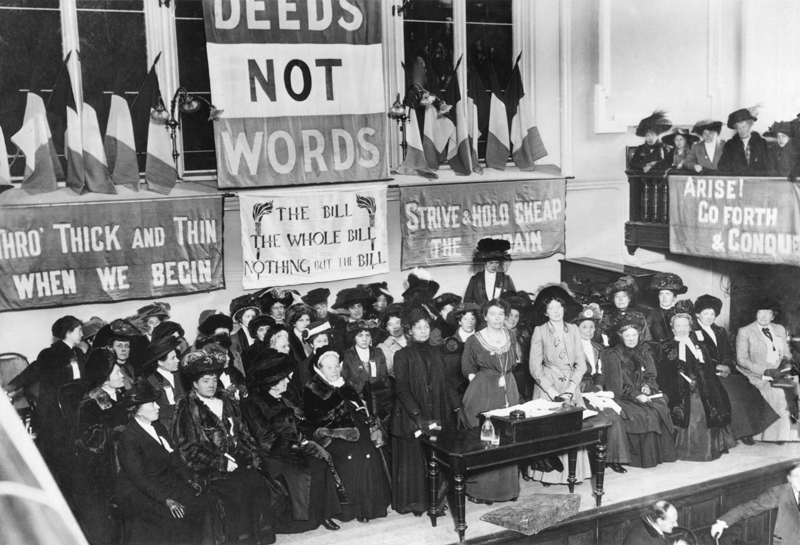 Over the years I have written a number of blogs on democracy and voting, and with the 100 year anniversary, I wanted to take some time to reflect on progress. As someone who grew up thinking everyone was taught at school about the suffragist and suffragette movements, it continues to astound me how we take for granted our democratic rights. I grew up knowing that women before me fought for my right to vote and gave up their lives for that right, and to not vote betrayed that sacrifice.
Over the years I have written a number of blogs on democracy and voting, and with the 100 year anniversary, I wanted to take some time to reflect on progress. As someone who grew up thinking everyone was taught at school about the suffragist and suffragette movements, it continues to astound me how we take for granted our democratic rights. I grew up knowing that women before me fought for my right to vote and gave up their lives for that right, and to not vote betrayed that sacrifice.
Reflecting on how hard fought votes were for women and the majority of men, why do so many disengage? Election turnout was at its highest in 1950, with 83.9%, the highest under universal suffrage and first election to be televised. But a struggle was taking place between a Labour Party which had introduced nationalisation and a Conservative Party hit badly by defeat in 1945. The campaign focussed on the future of nationalisation, a polemic for or against. The lowest turnout was 2001 59.4% marred by voter apathy, with opinion polls predicting a significant Labour win, and it was dubbed the quiet campaign, coming on the back of an uneventful Labour term whilst the Conservative Party was mired in internal issues over the EU.
Turnout has been slowly increasing since then but still only at 68.7% in 2017. We have a significant proportion of voters, who do not vote, add to that the numbers who don’t register and a significant proportion of the population do not engage in democracy. As we saw in the referendum we had one the highest turnouts in decades at 72.2% however that leaves 12.9m who did not vote. At a local level, this drops even further with local elections returning numbers as low as 30 – 40%.
We still take for granted the privileges we have and risk losing its benefits:
- Reducing inequality by preventing the capture of power by elite groups – power is spread wider and in a more representative way;
- Representing diverse opinions and needs of individuals across government, and ensuring government money helps those in need;
- Having greater control and power over our own everyday lives;
- Countering extremism from either direction; and
- Maintaining local decision making and accountability.
Fewer and fewer people are exercising their right to shape what we will be, at both a country and community level. The voting population is disillusioned and feels excluded from the decision making; and political parties, individual politicians and the government should take action to re-engage the electorate.
In recent years much has been made of the youth turnout, however, this is still low, but increasingly young people are motivated by issues; and the current system fails to communicate issues in a way that is meaningful to voters.
We live in an increasingly complex society where issues have multiple and intertwining causes and effects, whilst voting is often binary and the more simplistic the decision the easier it is to make. Turnout drops when people don’t understand the issues presented to them or it isn’t relevant to them. Our research is trying to understand these complexities and enable people to engage with them and understand them, but policy has to battle this complexity versus simplicity issue constantly.
What would Millicent Fawcett say looking down on today? I would think she would look to a review of the system, and why the voting process and current political maelstrom is turning people away from having their say. As a believer in equal rights and being good citizens, I fear she would be horrified at the lack of engagement and would look to campaign to reform it. Emmeline Pankhurst would probably be disappointed in the time it has taken and how little we have travelled. She would be calling on Parliament to answer to the fact they cannot attract a voting populace and what right do they have to make decisions on our behalf on such small numbers of votes.
If our past predicts our future it took 60 years to achieve enfranchisement of women, and 100 years later we still do not have a balanced parliament, which fully reflects our society, in gender, social background, ethnicity or sexuality. How do we speed this process up? How do we create a democracy which responds to the needs of its citizens and ensures they have a say in their own future?
This blog was written by Rebecca Riley, Administrative Director, City-REDI, University of Birmingham.
Disclaimer:
The views expressed in this analysis post are those of the authors and not necessarily those of City-REDI or the University of Birmingham
To sign up for our blog mailing list, please click here.
